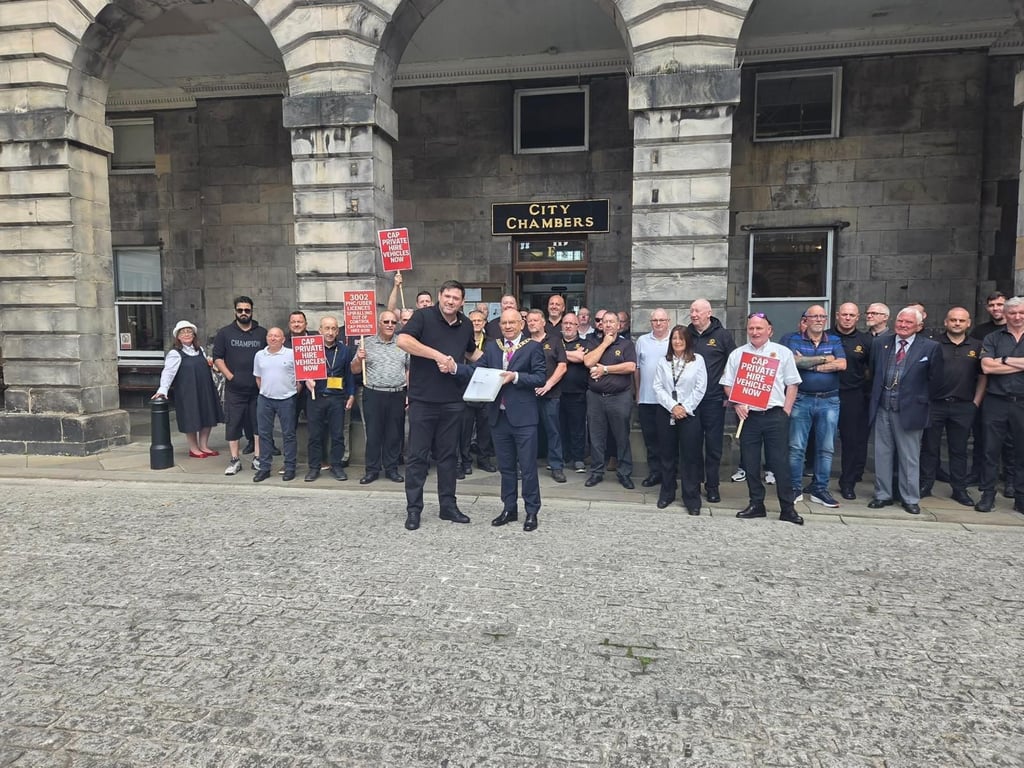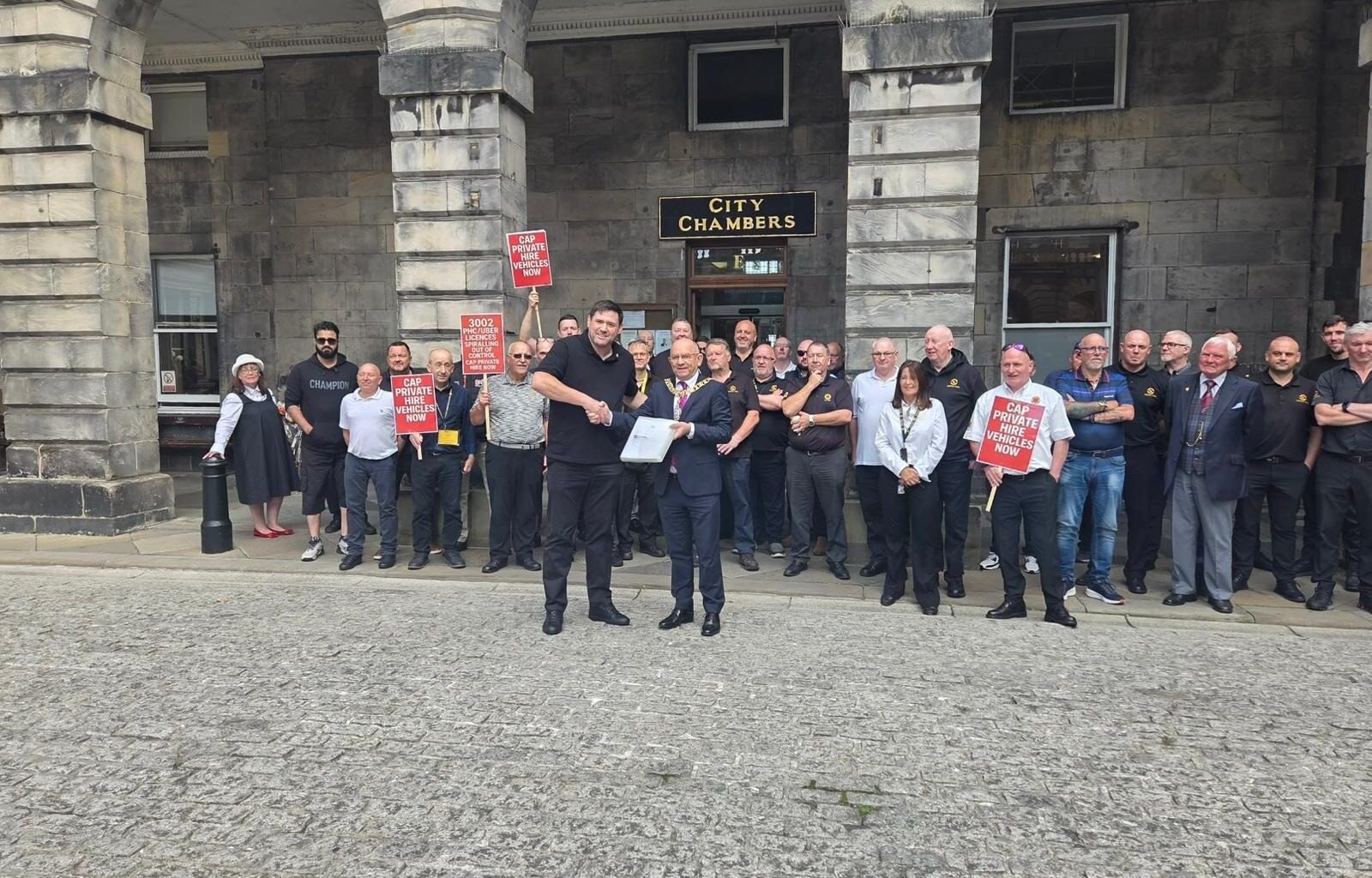According to council papers published ahead of a meeting of the Regulatory Committee on Friday, council officers have completed a procurement process for a survey of taxi demand.
Conducted every three years, the survey aims to evaluate the demand for taxi services in the city, in order to ensure enough taxi licences are available.
At present, there is a limit of 1,316 licences in the city, with 1,105 in use – meaning 211 are available to be granted to new drivers.
The city’s last review of the number of licences found that there was not an overprovision of taxi licences in the city.
It comes as taxi drivers have raised concerns about the numbers and safety of rideshare and other private hire cars in the city.
 Taxi drivers passed the petition in to the council last week
Taxi drivers passed the petition in to the council last week
Last month, a petition with over 1,200 valid signatures calling for a cap to be placed on the number of private hire cars in the city was handed in to the council by city cab drivers.
The petition is now set to be considered at Friday’s meeting, where councillors have the power to take action on the petition if they think it is warranted.
It was launched as a result of concerns over the sustainability of the taxi field in the face of rideshare companies like Uber and Bolt, which can charge lower fares than the regulated ones in taxis.
There are around 3,000 private hire cars in the city, many working for rideshare firms like Uber and Bolt.
Keith Auld, a city black cab driver and organiser of the petition, said: “It’s a risk to our livelihoods because there’s too many cars chasing the same jobs. Ultimately, something’s going to have to give.
“I’m all for working in harmony with private hire. But there needs to be a balance – we are now beyond the tipping point, we need the cap to be applied to give us a chance.
“The numbers speak for themselves, they’re almost treble our taxis.”
Taxi drivers also raised concerns about the safety of private hires in the city, with worries that some drivers might be pulling extremely long hours to make ends meet.
Jamie Stalker, secretary of Edinburgh’s Unite taxi drivers’ branch, said last month: “The safety aspect of what’s going on in the city just now – there’s so many private hires out there.
“And because they’re not making a decent living, they’re working anywhere up to 10 to 15, 16, 17 hours every day. That’s dangerous.
“Uber has got a thing on their app where they can log them off after 10 hours of working, but then all they do is just jump on to another app, or go and work for one of the local private hire companies, so there’s no control.
“They’ve been lucky that there hasn’t been a major car accident, or somebody falling asleep at the wheel, that sort of stuff.”
Bolt told the Local Democracy Reporting Service at the time that their service was not meant to supplant black taxis, and that their drivers earned the national minimum wage.
And both Bolt and Uber said their drivers were entitled to holiday pay and a pension.
Edinburgh Council last considered whether a cap on the number of private hire cars in the city was needed in 2022, as part of a survey commissioned in 2019.
In February 2023, the Regulatory Committee agreed, based on the survey results and stakeholder consultation, that no cap on private hire cars was needed.
The city also reports the number of private hire cars to councillors every year, with the last notification coming in January of this year.
Last month, Liberal Democrat councillor Neil Ross, convener of the Regulatory Committee, said: “We regularly review the number of PHCs in the city, most recently in January 2025.
“We have received a petition on this issue, and it will be addressed under the Council’s petition process.
“The Council maintains regular contact with the relevant trade groups and will continue to listen to their broader feedback.”
The number of taxi licences in Edinburgh is set to be reviewed as a council committee considers a petition by cabbies to limit the amount of private hire cars on the streets.
According to council papers published ahead of a meeting of the Regulatory Committee on Friday, council officers have completed a procurement process for a survey of taxi demand.
Conducted every three years, the survey aims to evaluate the demand for taxi services in the city, in order to ensure enough taxi licences are available.
At present, there is a limit of 1,316 licences in the city, with 1,105 in use – meaning 211 are available to be granted to new drivers.
The city’s last review of the number of licences found that there was not an overprovision of taxi licences in the city.
It comes as taxi drivers have raised concerns about the numbers and safety of rideshare and other private hire cars in the city.
Last month, a petition with over 1,200 valid signatures calling for a cap to be placed on the number of private hire cars in the city was handed in to the council by city cab drivers.
The petition is now set to be considered at Friday’s meeting, where councillors have the power to take action on the petition if they think it is warranted.
It was launched as a result of concerns over the sustainability of the taxi field in the face of rideshare companies like Uber and Bolt, which can charge lower fares than the regulated ones in taxis.
There are around 3,000 private hire cars in the city, many working for rideshare firms like Uber and Bolt.
Keith Auld, a city black cab driver and organiser of the petition, said: “It’s a risk to our livelihoods because there’s too many cars chasing the same jobs. Ultimately, something’s going to have to give.
“I’m all for working in harmony with private hire. But there needs to be a balance – we are now beyond the tipping point, we need the cap to be applied to give us a chance.
“The numbers speak for themselves, they’re almost treble our taxis.”
Taxi drivers also raised concerns about the safety of private hires in the city, with worries that some drivers might be pulling extremely long hours to make ends meet.
Jamie Stalker, secretary of Edinburgh’s Unite taxi drivers’ branch, said last month: “The safety aspect of what’s going on in the city just now – there’s so many private hires out there.
“And because they’re not making a decent living, they’re working anywhere up to 10 to 15, 16, 17 hours every day. That’s dangerous.
“Uber has got a thing on their app where they can log them off after 10 hours of working, but then all they do is just jump on to another app, or go and work for one of the local private hire companies, so there’s no control.
“They’ve been lucky that there hasn’t been a major car accident, or somebody falling asleep at the wheel, that sort of stuff.”
Bolt told the Local Democracy Reporting Service at the time that their service was not meant to supplant black taxis, and that their drivers earned the national minimum wage.
And both Bolt and Uber said their drivers were entitled to holiday pay and a pension.
Edinburgh Council last considered whether a cap on the number of private hire cars in the city was needed in 2022, as part of a survey commissioned in 2019.
In February 2023, the Regulatory Committee agreed, based on the survey results and stakeholder consultation, that no cap on private hire cars was needed.
The city also reports the number of private hire cars to councillors every year, with the last notification coming in January of this year.
Last month, Liberal Democrat councillor Neil Ross, convener of the Regulatory Committee, said: “We regularly review the number of PHCs in the city, most recently in January 2025.
“We have received a petition on this issue, and it will be addressed under the Council’s petition process.
“The Council maintains regular contact with the relevant trade groups and will continue to listen to their broader feedback.”
By Joseph Sullivan Local Democracy Reporter
The Local Democracy Reporting Service (LDRS) is a public service news agency. It is funded by the BBC, provided by the local news sector (in Edinburgh that is Reach plc (the publisher behind Edinburgh Live and The Daily Record) and used by many qualifying partners. Local Democracy Reporters cover news about top-tier local authorities and other public service organisations.
Like this:
Like Loading…
Related
